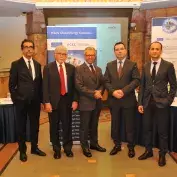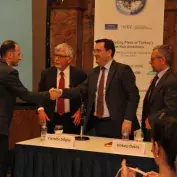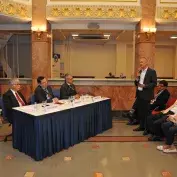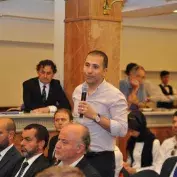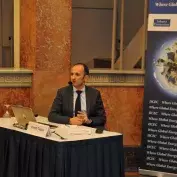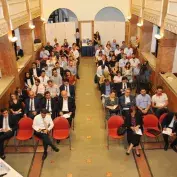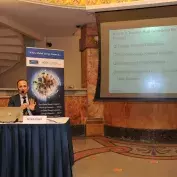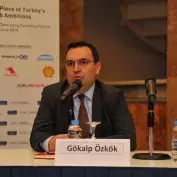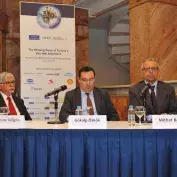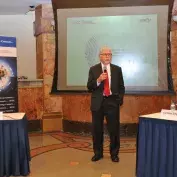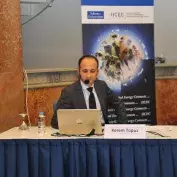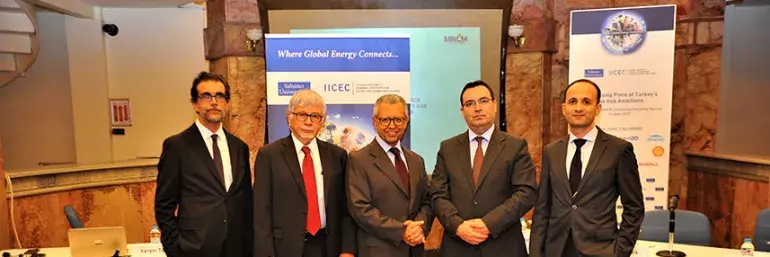
Seminar by Kerem Topuz "The Missing Piece in the Turkey's Gas Hub Ambitions”
As part of the IICEC Energy and Climate Research Series, IICEC hosted a seminar on the issue of gas trading hub and Turkey’s ambitions towards this direction on June 13 at Minerva Palas.
MNCM Consulting Founding Partner Kerem Topuz presented his paper titled: "The Missing Piece in the Turkey's Gas Hub Ambitions”. In the paper, Turkey's unique position as a "Physical a Natural Gas Trading Hub” was emphasized. The presentation of Kerem Topuz was followed by a distinguished panel moderated by IICEC Director Prof. Dr. Carmine Difiglio. The distinguished panelist were Country President and CEO of ENGIE Turkey Gökalp Özkök and retired Ambassador Mithat Rende.
The recent developments in gas markets, most notably the LNG waves, are promising and deserve particular attention in terms of more sustainable and competitive gas supplies. The advantages can be realized by an improved international trade of gas molecules. A transparent international natural gas trade requires regional pricing at hubs that provide physical supply and commodity trading in a competitive market framework. In spite of the fact that gas-to-gas competition has been emerging across Europe, the gas markets still remain exposed to developments in global oil market, a situation completely different than the U.S. where gas prices are de-linked from oil prices.
Analyzing the current situation and outlook in natural gas supply, demand, trade and infrastructure, the report presents why Turkey has a credible opportunity to become a physical natural gas trading hub in its region.
Because of the large volume of gas being imported into Turkey from multiple sources and Turkey’s already well advanced natural gas infrastructure, Turkey has unique locational advantages for developing into a regional gas hub. The paper provides an analytical insight to multiple benefits of establishing such a hub and explains why this would be a win-win-win for Turkey, Europe and Turkey’s natural gas suppliers. Providing information and analyses on Turkey’s natural gas use in each economic sector, pipelines, LNG regasification capacities and distribution infrastructure, gas supply and demand drivers and outlook in Turkey, Europe and the gas supplier regions, the paper outlines requirements for a well-functioning trading hub based on defined indicators and presents an assessment of Turkey’s ability to meet these requirements
Turkey has achieved notable progress in advancing its natural gas related infrastructure in the past few years. Therefore, the additional infrastructure requirements for a Turkish gas hub are minor compared to the changes that would be required in renegotiating natural gas import contracts to eliminate destination clauses and achieve more flexible pricing terms; and unbundling BOTAŞ contracts sufficiently to meet the requirements of a transparent and competitive gas trading hub.
The paper presents a transitionary approach towards the realization of the gas hub perspective. BOTAŞ continues to be necessary to be a counterparty for new pipeline investments and to provide price stability in Turkey in light of the Turkish economy and consumers. At the same time, Turkey would benefit from lessening current dependencies on the state towards a market system. Moving in this direction would be an evolutionary process. BOTAŞ’ current long-term contracts will not be terminated until midst of 2020’s. A certain amount of time must elapse before BOTAŞ would be able to unbundle its contracts and other policies be established to protect Turkish consumers. Presenting the pillars for becoming a well-functioning gas hub within an analytical approach, the paper analyzes the current situation in the Turkish natural gas market. Towards the objective of becoming a regional gas trading hub, the recommendations include
- Renegotiating existing contracts to eliminate destination clauses, resolving take-or- pay obligations, increasing flexibility, and making price revisions mark-to-market
- Taking steps to increase number of market participants, releasing more gas to other players, improving links with the power market, improving the wholesale market, allowing new import licenses
- Improving transparency and predictability that would ensure a clear pricing strategy as well as elimination of any direct or indirect subsidies within a realistic time plan and economic countermeasures to be taken
- Establishing alternative markets like futures markets and financial hedging instruments
- Unbundling of transmission system operator, importer, and wholesaler functions of BOTAŞ
The paper presents substantial benefits that would be achieved by establishing such a hub. These benefits for Turkey include
- enhanced energy security and efficiency gains,
- lessened exposure to global oil prices in total energy import bill,
- new services, businesses, value add and employment opportunities.
The paper presents how a Turkish gas hub would also be beneficial in several ways for both gas suppliers and demanding markets such as Europe.
ENGIE Turkey CEO Mr. Gökalp Özkök said: “Our natural gas infrastructure is quite new compared to many examples in Europe and investments are continuing. We are quite advantageous in this regard. However, there is competition among countries in the region for the same goal. Therefore, Turkey's competitive advantages should be further demonstratedI consider the focus on shorter, more flexible contracts to be an important element in dealing with gas purchasing contracts. Pricing and predictability in the market are important issues. Overall, market dynamics and a more competitive development of the natural gas market are important aspects.”
The fact that having major advantages such as being a large gas consumer and having a developed physical infrastructure is already positioning Turkey as a gas hub was pointed out by retired Ambassador Mithat Rende. Retired Ambassador Rende expressed that there are countries that have the same goal among Turkey’s neighbors. Turkey has great advantages in order to become a regional Gas Hub, however there are also aspects that require further improvement. This is not an overnight job, all stakeholders in our country need to work together. Turkey's gas trade should be supported. It is important that prices are formed in the market environment. Market operation, predictability and transparency are crucial to achieving this goal.
